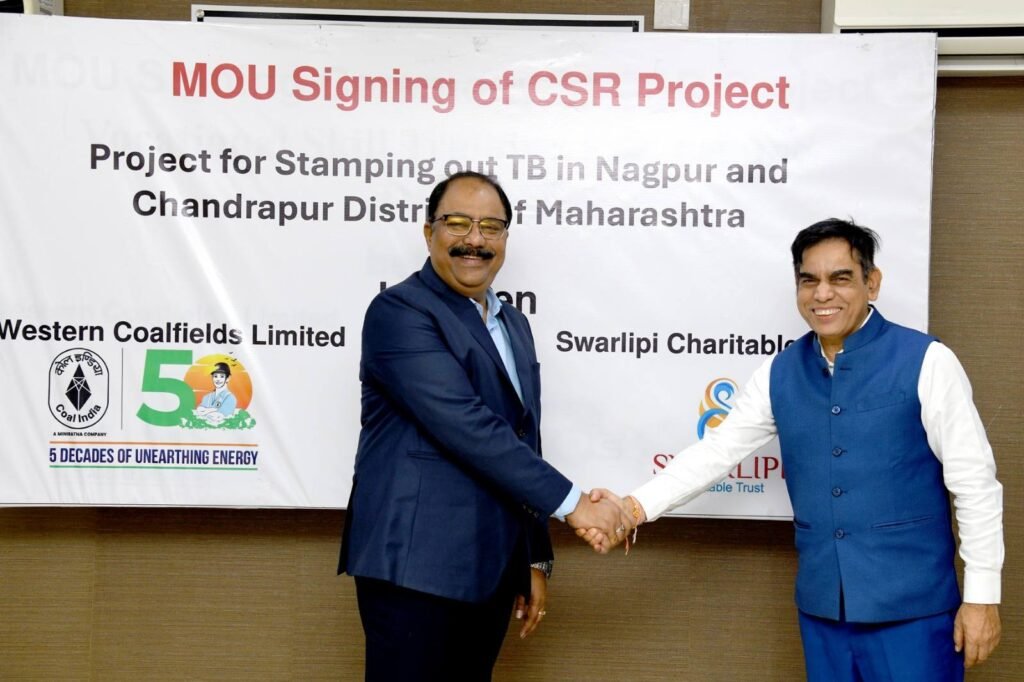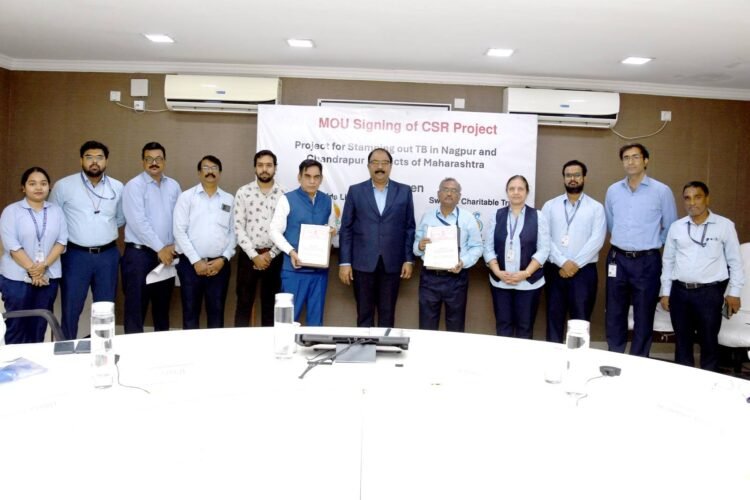On October 17, 2025, WCL advances India’s TB-free goal through a CSR MoU with SCT, launching comprehensive prevention and management programs in the coal belt districts of Maharashtra.
Nagpur (India CSR) — Western Coalfields Limited (WCL), a subsidiary of Coal India Limited, has entered into a Memorandum of Understanding (MoU) with Swarlipi Charitable Trust (SCT) to launch a major Corporate Social Responsibility (CSR) initiative aimed at eliminating tuberculosis (TB) in Maharashtra’s Nagpur and Chandrapur districts. The agreement was signed on Friday, marking a significant step toward India’s goal of becoming TB-free by 2025.
WCL to Lead TB Eradication Drive in Coal Belt
Under the partnership, WCL will implement a comprehensive programme titled “Stamping Out TB – TB Prevention, Detection, and Management.” The initiative will focus on door-to-door screening, early diagnosis, and nutritional support for affected individuals. The project is being rolled out in coal mining regions where workers and residents face higher risks of respiratory illnesses.
The MoU was signed in the presence of Dr. Hemant Sharad Pande, Director (HR), WCL, by G. Sitaraman, General Manager (CSR/Welfare), and Dr. D.K. Singh, Chairman, Swarlipi Charitable Trust. The initiative seeks to strengthen public health infrastructure and community resilience in one of India’s most industrially active but health-vulnerable belts.
***

Screening, Nutrition and Awareness to Form the Core of the Project
The “Stamping Out TB” programme will deploy trained health workers to conduct door-to-door TB screening using portable diagnostic kits. The project will link patients to treatment under the National TB Elimination Programme (NTEP) and offer nutrition kits to combat malnutrition, a key factor in TB vulnerability. Awareness drives through street plays, school activities, and local media will also be conducted to break social stigmas around the disease.
***
WCL Reinforces Social Responsibility in Mining Regions
The initiative comes as part of WCL’s broader CSR strategy to strengthen healthcare in mining-affected communities. The company has previously undertaken programmes in education, skill development, and environmental sustainability. With this MoU, WCL adds public health to its core social priorities, showcasing how coal PSUs can contribute to India’s Sustainable Development Goals (SDGs) through proactive CSR measures.
***
Synergy with National Ambitions
This MoU isn’t operating in a vacuum; it’s a cog in India’s grand machinery against TB. The NTEP, a flagship under the Ministry of Health and Family Welfare, has slashed incidence by over 20% since 2015, but pockets like Maharashtra’s coal belt lag behind. WCL’s CSR infusion—leveraging its proximity to affected populations—bolsters this national drive, potentially serving as a model for other PSUs. By integrating with NTEP protocols, the project avoids duplication, amplifying impact through shared data and resources.
***
Core Pillars of the TB Fight
At its essence, the “Stamping Out TB” programme is a multi-pronged assault on the disease, designed with the precision of a coal cutter but the compassion of a community healer. Door-to-door screening forms the frontline: teams of trained health workers will fan out into neighborhoods, using portable diagnostics to identify symptoms before they escalate. Imagine a young mother in a Chandrapur village, her cough dismissed as fatigue, now getting a swift test that could save her life—and her family’s.
Diagnosis won’t stop at detection; it’ll flow into rapid treatment linkages, connecting positives to government clinics under the National TB Elimination Programme (NTEP). Nutritional support adds a vital layer—TB thrives on malnutrition, so beneficiaries will receive tailored meal kits rich in proteins and vitamins, fortifying bodies against the illness’s toll. And awareness? That’s the spark that ignites change. Campaigns via street plays, radio jingles, and school workshops will demystify TB, shattering stigmas that keep people from seeking help. From myths about contagion to facts on free treatment, these efforts aim to empower, not just inform.
The project’s timeline, though not publicly detailed yet, hints at a three-year rollout, with milestones tied to screening coverage and treatment adherence rates. SCT’s involvement ensures cultural sensitivity—messages in local dialects, respecting tribal nuances in Chandrapur’s forested pockets—making the intervention feel like a neighbor’s advice, not a top-down directive.
(India CSR)





